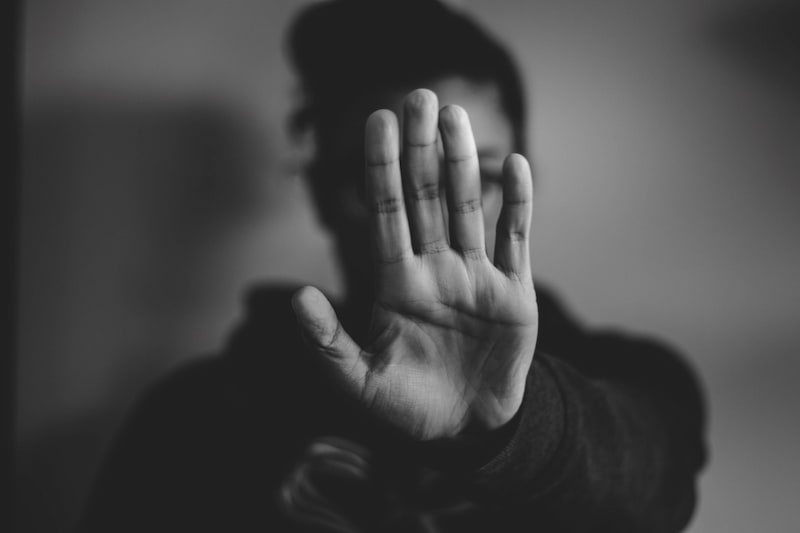Feeling Trapped?
9 Ways to Finally Break Free
by
You feel suffocated and weighed down by some kind of invisible force.
And you don’t really know why, but this force is relentless … No matter what you do, you carry this knotted heaviness inside everywhere you go.
Nothing feels right anymore.
You look at your life and marvel at how it doesn’t feel like ‘yours’ at all. You desperately want to escape, you badly want to do something … but you’re terrified of destroying everything you’ve built so far.
You just can’t seem to move. You feel paralyzed.
All of us will feel trapped at some point, whether that be in a job, house, neighborhood, financial circumstance, religion, family, or relationship.
Usually, feeling trapped can be easily remedied by simply doing something new – but it’s not always that easy. When feeling trapped becomes a persistent problem, one that makes you feel hopeless, then it’s time to take a serious look at your life.
Table of contents
5 Reasons Why You’re Feeling Trapped

Feeling trapped and defeated are experiences common to people who face anxiety and depression, according to psychological research. In other words, feeling trapped can create anxiety and depression, which further reinforces the feeling of being trapped. And so the cycle continues.
But the question is, why do we feel trapped in the first place? Anxiety and depression may trigger this experience, and also be the byproduct of it, but what actually creates the anxiety and depression?
Here are some common psychological and spiritual reasons why you might be feeling trapped:
1. You were conditioned to be passive

Passivity is often a learned behavior that we’re taught in childhood by our parents, teachers, and societies. For example, being headstrong is generally a trait that is discouraged in society because it makes you less governable, meaning that others have less influence over you.
As such, in childhood, many of us were taught to be submissive, compliant, and docile because these traits made us “good members” of a society that revolves around control and power.
As young people, how many of us felt empowered and encouraged to take a proactive approach to our life, and to be and do whatever we desired, even if that went against “the norm”?
Of course, most people pay lip service to this “empowerment” ideal (such as our teachers and even parents), but only within the confines of doing socially acceptable things like going to university, chasing after money and status, and getting married and having kids.
On one hand we’re encouraged to be “proactive” about our lives, but on the other hand, this “proactivity” is a disguised form of passivity which is all about following the crowd and doing what everyone else does.
Is it really any wonder that so many of us struggle with feeling trapped? Unless we have the wisdom to see through the futile and unfulfilling pursuits of society from a young age, we end up following the herd and letting others dictate our lives.
Passivity is, therefore, a major cause of feeling trapped and stuck in a life that seems empty. When we’re passive, we’re literally giving others the permission to make our decisions and dictate our existence on this earth. When we’re passive, we’re resigned to accepting our “lot” in life, without realizing that it is actually in our hands to create a life of our own choosing.
If you have just realized that you’ve taken a passive approach to life, don’t worry. Most people on this planet have. It’s not that you choose to be passive, it’s that you’re psychologically programmed and conditioned to be this way. But with this new knowledge, you can pull off the blindfold and start consciously being proactive and self-sovereign with your life again.
See: How to Embrace Being a Lone Wolf and Walk Your OWN Path »
2. You’ve simply outgrown your current life

Here’s the thing, people are not static beings. As human beings, we are forever changing, evolving, and transforming.
Anything that does not change, dies, as we can quite clearly see in the world around us. When species, ecosystems, and even business and trends don’t evolve, they fade away into oblivion. This natural law is evolution in process.
And the same goes for us as people: we are changing each and every day. We might not be consciously aware of it (because we’re usually evolving in minuscule ways), but we are not the exact same person as we were this time yesterday.
Ask yourself, “Am I the exact same person as I was a year ago?” Likely, your answer will be no, you’ve changed! And this is completely fine!
Feeling trapped is therefore often a product of simply outgrowing your current life. Perhaps you don’t have much in common with your friends anymore, your career interests have changed, or you just don’t relate as deeply to your partner anymore.
This is all completely normal, yet as humans, we tend to pathologize change. We become neurotic and fearful about it because we desperately want to control life to give us a sense of comfort and security. But the truth is that change is inevitable – resistance is futile!
When you aren’t willing to upgrade or change your life, even when you’ve outgrown it long ago, you feel suffocated. Just imagine how uncomfortable it would be squeezing yourself into the clothes you wore ten or twenty years ago! Yes, you might feel comforted in some small way … but is the comfort and familiarity you feel worth the experience of dying inside?
Remember that it’s completely normal to not want to let go, so be gentle and compassionate towards yourself. It’s OK to grow and change. It is your birthright.
See: 11 Exhilarating Ways to Be True to Yourself (When Scared) »
3. You desperately want to fit in and feel “normal”

All of us want to feel like we belong. In fact, craving to “fit in” with others is deeply embedded into our DNA: it’s a biological survival mechanism.
But we’ve come a long way in our evolution, and the proof is that the more we force ourselves to be “normal,” the more we suffer. Evolution, or rather involution, is now calling us to honor our authentic needs in order to grow as a species.
Conformity is an old paradigm we no longer need to chase after. In fact, the more we conform, the more empty we feel inside. The more we try to be like others, the more we lose contact with our inner voice. The more we mold our lives to be “socially acceptable,” the more we sacrifice our inner values, dreams, beliefs, and desires.
Trying to fit in with others because we fear what they think about us, is a recipe for suffering. Understand that wanting to be accepted is completely normal, but it’s time that you start looking inside of yourself for approval, rather than outside.
See: How to Embrace Being a Lone Wolf and Walk Your OWN Path »
4. You’ve taken on too many responsibilities

Responsibilities are a normal part of life; they teach us to be mature, accountable, patient, and empathetic.
But there can come a point in our lives when we take on more responsibilities than we can handle … and we start to feel TRAPPED.
Why? Usually, we fill our lives with pointless or excessive commitments because we’re trying to escape from something, whether that is our pain, our insecurities, our past, our traumas, or some kind of buried emotion that haunts us like grief, emptiness, or anger.
If you’re feeling trapped, closely examine your life. Have you bitten off more than you can chew? Why? And furthermore, what can you do to decrease your workload?
5. Soul loss and lack of life purpose

Probably the biggest reason why many of us undergo the excruciating feeling of being trapped is soul loss.
When we have lost contact with our souls we feel the unshakable sense that ‘something is missing’ from our lives.
This feeling is accompanied by loneliness, emotional numbness, emptiness, restlessness, irritability, and of course, anxiety and depression.
Soul loss occurs for many reasons such as a traumatic life experience or simply situations where we’ve had to consistently shape ourselves into who others want us to be (causing us to feel repressed and withered inside).
The ego is our false self, the concept of “me” that we have inside of our brains which is based on stories about the past or future.
The more we serve our ego and its desires, the more empty and unfulfilled we feel because the ego is obsessed with power, control, and self-gratification – something that is ultimately unfulfilling.
Our soul, on the other hand, is focused on love and unity: on learning how to love, behaving from a place of love, speaking with love, and ultimately, embodying love as our True Nature.
When we are in contact with our souls, we discover our unique life purpose which helps us to stop feeling trapped by our circumstances. We start to feel empowered and begin to listen to the voice of the heart rather than the voice of the mind.
Feeling trapped, therefore, is often a sign that you’re undergoing not just a loss of soul connection and therefore lack of life purpose, but you’re starting to “wake up” on a deeper level. You’re beginning the spiritual awakening process where you sense that there’s much more to life than meets the eye.
How to Stop Feeling Trapped (9 Paths)

Feeling trapped can be a self-perpetuating cycle: we begin to look for more and more proof to confirm our belief that we are victims. And that feeling of self-victimization fuels the feelings of being trapped.
Can you see how powerful the mind, and the hidden inner parts of the psyche, can be here?
For example, we might try to stop feeling trapped, but then, our inner saboteur might do something that causes us to fall back into that feeling again. As a result, we confirm the belief that we’re trapped, thus becoming a self-fulfilling prophecy.
So be careful. Understand that feeling trapped can actually be a very addictive role because it makes us feel like a victim – and the ego loves feeling like a victim.
Ironically, feeling like a victim is actually very empowering because this role revolves around blaming, justifying, and making excuses – and all of these behaviors deflect self-responsibility.
With that in mind, let’s explore some methods which can help you to stop feeling trapped:
1. Take responsibility for your life

As I just mentioned, feeling trapped can cause us to adopt the victim role which revolves around avoiding self-responsibility. It’s normal to feel sad about your situation, but self-pity ultimately gets you nowhere.
In order to feel better, you need to take responsibility for your life, which means deciding to create change from a conscious and intentional place. Realize that happiness is what happens when you step up and claim ownership of your life.
2. Make little changes each day

Do something new each day. Approaching your life differently little by little will help you to regain faith in your own power. Even if you’re in a really tight, oppressive, and constricting situation where it feels like there’s no escape, what one little thing can you do to regain a sense of self-sovereignty each day?
For example, maybe you decide to take a new route to the shops or set the habit of researching one new way to become financially independent each day. No matter how small and seemingly inconsequential the change is, do it. Commit to it with religious fervor. If no one is coming on their white horse to save you, you need to find a way to save and free yourself.
3. Make a bullsh*t list

Sit down and think about all the things in your life that you believe are limiting you.
For example, on your bullsh*t list you might write things like:
- going to after work parties with colleagues that I secretly dislike
- commitments with old friends who I have nothing in common with
- pretending to like what my partner likes
- “mandatory” luncheons with extended family members who are toxic
- being passed over at work for promotions and taken for granted
- being interrupted in conversations
- not dividing the household chores equally with my partner
By becoming very clear about what is making you unhappy, you’ll find it easier to escape the cage that has been built around your life by stepping up and saying “no, this isn’t acceptable.”
4. Throw away social norms

Trying to be socially acceptable wastes so much time, energy, and money. Try to keep only what is essential in your life. If you have to step on a few toes, so be it!
If you’re not pissing someone off, you probably aren’t doing anything meaningful with your life!
No matter what we do, we’ll always have naysayers. Be courageous and do what makes you happy, even if that means cutting some people off or accepting that you’ll be thought of as “weird” or “crazy.” Those that do not support you tend to hang around you like dead weight, so throw social norms to the wind, and let it go.
5. Create energy barriers

Are you over-extending yourself and getting bogged down by too many commitments? Learn how to notice your energy levels and step away when you’re getting too overwhelmed. Ask yourself questions such as:
- Where in life am I giving more than getting? Is it really worth it?
- Who or what is an energy vampire, draining my vital life force energy?
- What kind of energy barriers do I need to set up in my relationships and work life?
- How much time am I really ready to dedicate to _____ ?
Draw a line and don’t let anyone cross it, not even yourself.
6. Say “no thank you”

There is nothing wrong or impolite about saying “no thank you” or “thank you for thinking of me, but I can’t.” Yes, you may offend a few insecure people, but most people will respect your assertiveness and self-respect. You have the right to say no to doing things you’re not interested in or don’t believe in. So don’t let “yes” become a cage that entraps you.
7. Embrace fear of the unknown

One reason why we remain stuck in feeling trapped is that we’re scared of the unknown, i.e., what will our lives look like if we make a leap into drastic change? How will we deal with all of the intimidating newness in our lives?
Remember that it’s normal to fear the unknown: we are wired to be that way. The reptilian fight-or-flight and mammalian hunter-gatherer brain within us is always scanning the environment for threat – that’s just part of being human.
But we also have the prefrontal cortex or the thinking brain that needs challenge to thrive and feel alive. So take care of all three parts of your brain by going slowly (what your reptilian brain needs), comforting yourself and reaching out to others for advice (what your mammalian brain needs), and making plans and goals (what your prefrontal cortex needs). Embrace the fear of the unknown, and go ahead anyway.
8. Take a plant medicine

Obviously there is a disclaimer here: plant medicine is best taken with an experienced shaman or healer and you should seek professional advice if you suffer from mental illness (and abide by local laws, etc. etc.).
But going through such an experience can quite literally change your entire perspective of life.
Try to locate experienced and trustworthy practitioners who hold San Pedro, Peyote, Ayahuasca, or Psilocybin Mushrooms ceremonies either in your country or one nearby (if traveling is accessible to you). Even small quantities of marijuana which is now legalised in many countries, can be tremendously healing when done meditatively and intentionally.
Taking plant medicine is a sacred and profound experience which can help you develop new perspectives on your life, and even significantly reduce mental illnesses such as depression and anxiety. I always recommend trying a very small amount first, with someone you trust.
9. Reconnect with your soul

Plant medicine is one powerful and foolproof way of reconnecting with your soul. However, if you prefer other methods, you might like to explore various soul work practices such as vision quests, journaling, spiritual meditation, mindfulness exercises, catharsis, artistic self-expression, music, and other alternative forms of medicine that can help awaken this deep presence within you.
My favorite ways of soul searching involve using art, music, and creative written expression to connect with my deeper essence and meaning of life. I recommend that you choose one practice that you feel drawn toward, and stick with it for at least two months (the time a new habit takes to form).
Here are some guides I’ve written surrounding the soul which may be of help:
- Soul Communication: 7 Crucial Signs to Look Out For
- Soul Purpose: 5 Gateways to Finding Your Destiny
- What is a Soul? (and Can it Die, Escape, or Break?)
I hope this article has give you some helpful advice to help liberate yourself and has supported you in understanding why you may feel trapped.
Tell me, why are you feeling trapped? When did it start, and most importantly, what are you planning to do about it?













